人教版高一英语必修三Unit 2《 Healthy Eating》 小课文重点短语及句子分析课件(13张PPT)
文档属性
| 名称 | 人教版高一英语必修三Unit 2《 Healthy Eating》 小课文重点短语及句子分析课件(13张PPT) |
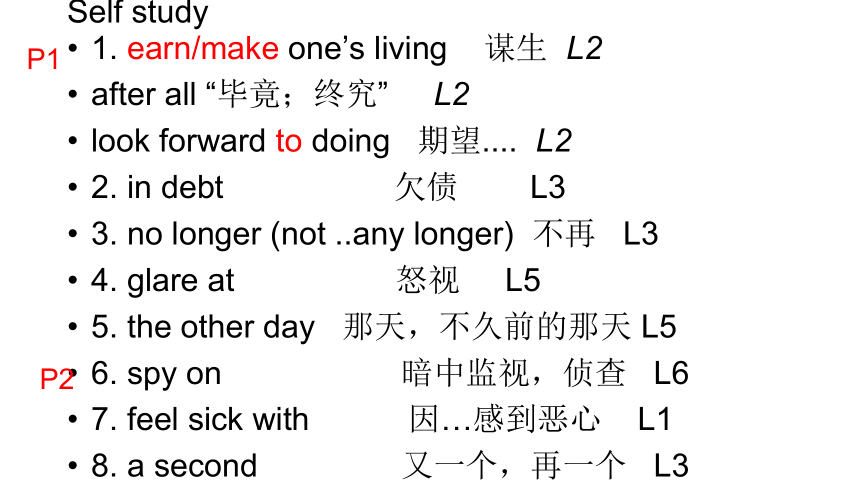
|
|
| 格式 | zip | ||
| 文件大小 | 126.3KB | ||
| 资源类型 | 教案 | ||
| 版本资源 | 人教版(新课程标准) | ||
| 科目 | 英语 | ||
| 更新时间 | 2020-02-13 09:50:58 | ||
图片预览

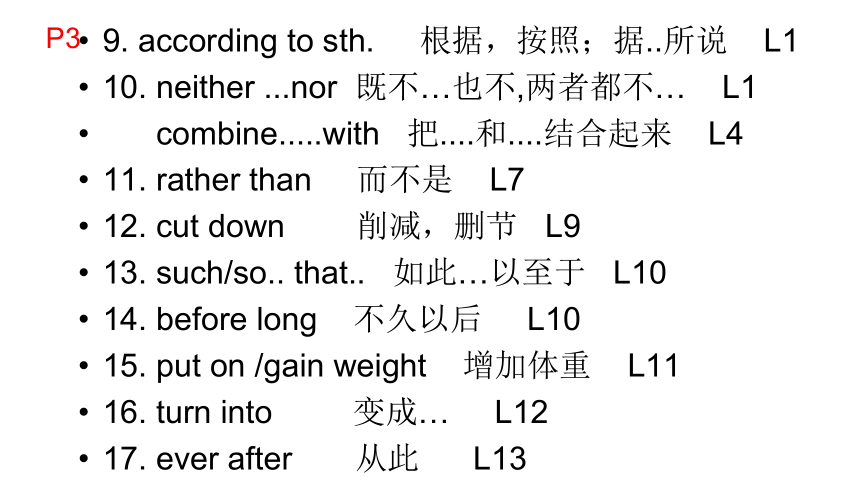
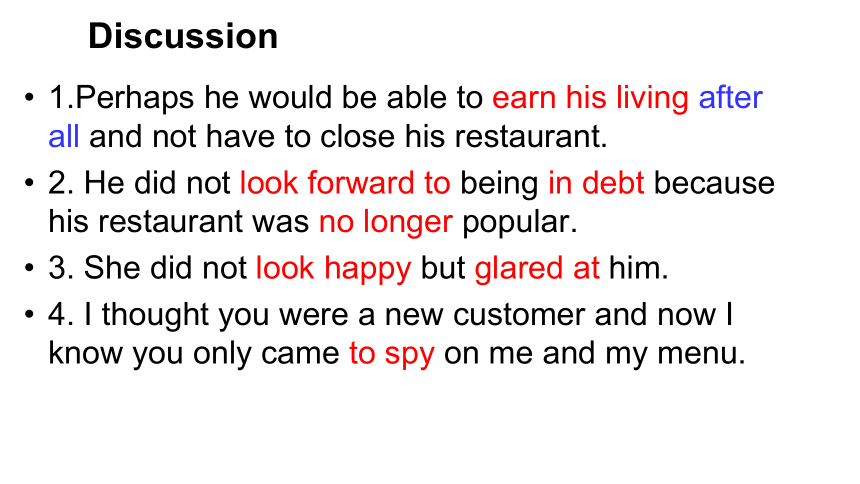
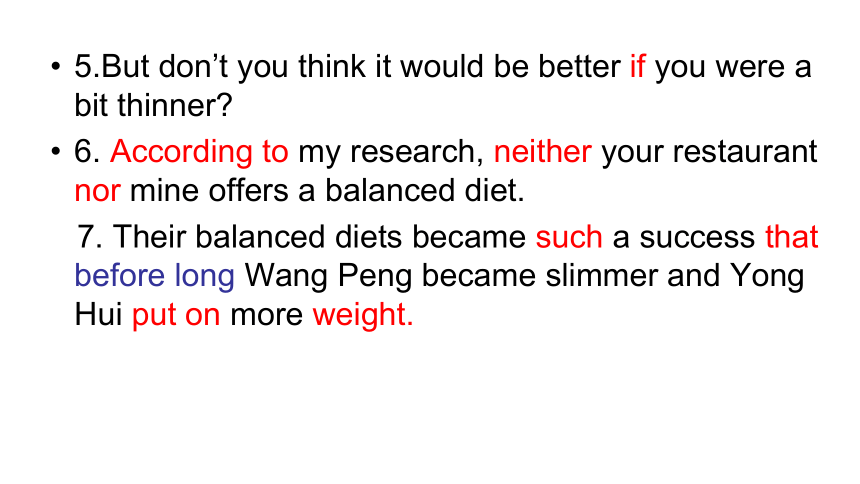
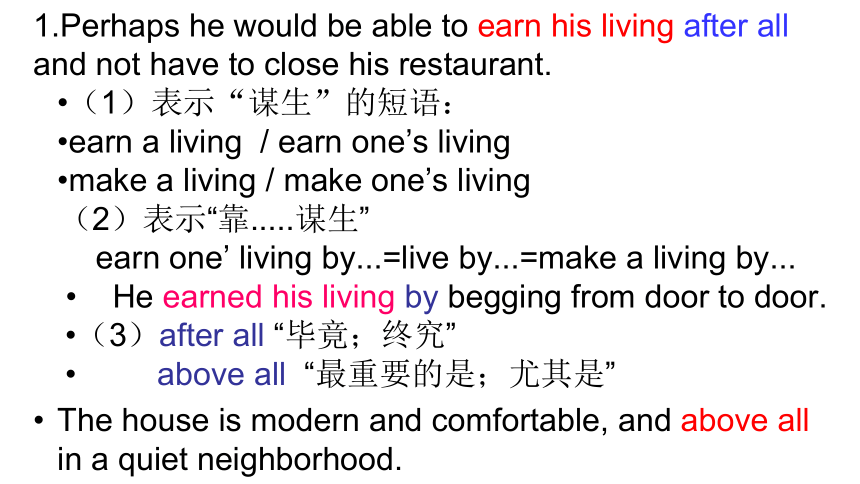
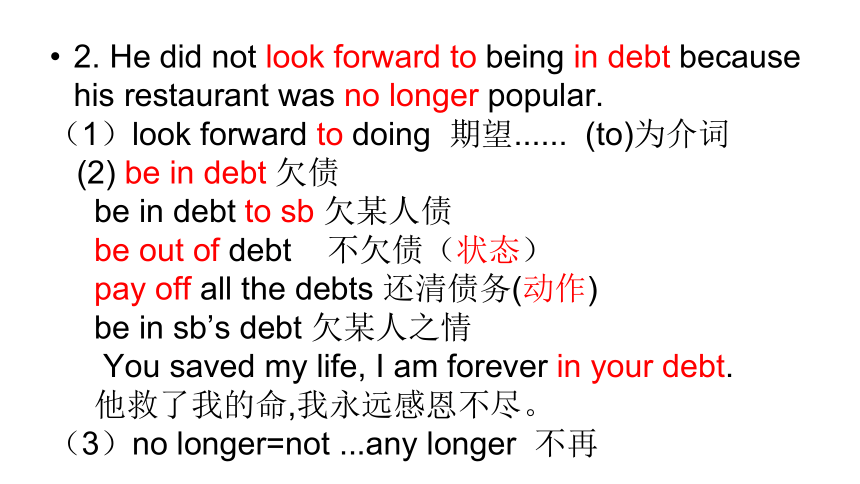
文档简介
(共13张PPT)
Self study
1. earn/make one’s living 谋生 L2
after all “毕竟;终究” L2
look forward to doing 期望.... L2
2. in debt 欠债 L3
3. no longer (not ..any longer) 不再 L3
4. glare at 怒视 L5
5. the other day 那天,不久前的那天 L5
6. spy on 暗中监视,侦查 L6
7. feel sick with 因…感到恶心 L1
8. a second 又一个,再一个 L3
P1
P2
9. according to sth. 根据,按照;据..所说 L1
10. neither ...nor 既不…也不,两者都不… L1
combine.....with 把....和....结合起来 L4
11. rather than 而不是 L7
12. cut down 削减,删节 L9
13. such/so.. that.. 如此…以至于 L10
14. before long 不久以后 L10
15. put on /gain weight 增加体重 L11
16. turn into 变成… L12
17. ever after 从此 L13
P3
Discussion
1.Perhaps he would be able to earn his living after all and not have to close his restaurant.
2. He did not look forward to being in debt because his restaurant was no longer popular.
3. She did not look happy but glared at him.
4. I thought you were a new customer and now I know you only came to spy on me and my menu.
5.But don’t you think it would be better if you were a bit thinner?
6. According to my research, neither your restaurant nor mine offers a balanced diet.
7. Their balanced diets became such a success that before long Wang Peng became slimmer and Yong Hui put on more weight.
1.Perhaps he would be able to earn his living after all and not have to close his restaurant.
(1)表示“谋生”的短语:
earn a living / earn one’s living
make a living / make one’s living
(2)表示“靠.....谋生”
earn one’ living by...=live by...=make a living by...
He earned his living by begging from door to door.
(3)after all “毕竟;终究”
above all “最重要的是;尤其是”
The house is modern and comfortable, and above all in a quiet neighborhood.
2. He did not look forward to being in debt because his restaurant was no longer popular.
(1)look forward to doing 期望...... (to)为介词
(2) be in debt 欠债
be in debt to sb 欠某人债
be out of debt 不欠债(状态)
pay off all the debts 还清债务(动作)
be in sb’s debt 欠某人之情
You saved my life, I am forever in your debt.
他救了我的命,我永远感恩不尽。
(3)no longer=not ...any longer 不再
3. She did not look happy but glared at him.
glare at 怒视
stare at 凝视;盯着
glance at/ over 瞥/看一眼
4. I thought you were a new customer and now I know you only came to spy on me and my menu.
only to spy... 在句中做目的状语
only to do sth. 和 only doing sth.
only to do sth. 表示一个与主语愿望相反的或出乎主语预料的结果,或用来暗示最初的未能实现的动作。
only doing sth. 表示谓语动词本身的动作造成的结果。
1. For nearly three hours we waited for the decision, only to be told to come again the next day.
2.He died, only leaving nothing but debts.
5.But don’t you think it would be better if you were a bit thinner?
if后的宾语从句是虚拟语气,表示与现在事实相反的假设。
1) 与现在事实相反,条件从句中的谓语动词用一般过去式(be的过去式用 were), 而主句中的谓语动词用“would (should, could, might) +动词原形”。
If we had time, we would go with you.
If I were you, I would study hard.
2) 与过去事实相反,条件从句中的谓语动词用过去完成时 ,主句中的谓语动词用“ would (should, could, might) + have +过去分词 ”.
If you had come earlier, you would have met him.
3) 与将来事实相反,条件从句中的谓语动词用一般过去式(be的过去式用 were), 或用“ were to (should) +动词原形 ”而主句中的谓语动词用“would (should, could, might) +动词原形”
If you dropped /were to drop/ should drop the glass,
it would break.
6. According to my research, neither your restaurant nor mine offers a balanced diet.
(1) neither ... nor ... 表示 “ 既不……也不……”。当连接两个主语时,应遵循 “就近原则”。
Neither dad nor mum is at home today.
(2) 若将neither ... nor ... 句型变为肯定句,只需把neither ... nor ... 改为both ... and ... 即可,同时谓语动词必须用复数形式。 Both dad and mum are at home today.
(3) either ... or ... 意为“或者……或者……;不是……就是……”之意。either ... or ... 连接两个主语时,其谓语动词应与最近的一个主语在人称和数上保持一致,“就近原则”.
Either you or I am going there tomorrow.
Either you or he is going there tomorrow.
7. Their balanced diets became such a success that before long Wang Peng became slimmer and Yong Hui put on more weight. before long 不久以后 put on weight: 体重增加
(1) such.....that../ so...that....如此...以至于....
1.such+ a(an)+adj.+单数可数名词+that......???
He?is?such?a clever?boy?that?everybody?likes?him.?
2.such+adj.+复数可数名词+that........??
They?are?such?interesting?novels?that?I?want?to?read?
them?once?again.?
3.such+adj.+不可数名词+that.......
He?has?made?such?great?progress?that?the?teachers?
are pleased?with?him.?
so...that...
1. so+adj./adv.?+?that.....
he?is?so?young?that?she?can't?look?after?herself.?
2. so+adj +a/an+单数可数名词+that…
This is so interesting a book that we all enjoy reading it.
注意:当名词前有many、much、(a)?few、(a)?little等词修饰句子中要用“so...that...”而不能用“such...that...”。
3.so+ many(多) / few(少) +复数可数名词+that…
He has so many books that I can’t count them.
4.so+ much(多) /little(少) +不可数名词+that…
There was so much food that we couldn’t eat it all.
I have so little money that I cannot afford a car.
Self study
1. earn/make one’s living 谋生 L2
after all “毕竟;终究” L2
look forward to doing 期望.... L2
2. in debt 欠债 L3
3. no longer (not ..any longer) 不再 L3
4. glare at 怒视 L5
5. the other day 那天,不久前的那天 L5
6. spy on 暗中监视,侦查 L6
7. feel sick with 因…感到恶心 L1
8. a second 又一个,再一个 L3
P1
P2
9. according to sth. 根据,按照;据..所说 L1
10. neither ...nor 既不…也不,两者都不… L1
combine.....with 把....和....结合起来 L4
11. rather than 而不是 L7
12. cut down 削减,删节 L9
13. such/so.. that.. 如此…以至于 L10
14. before long 不久以后 L10
15. put on /gain weight 增加体重 L11
16. turn into 变成… L12
17. ever after 从此 L13
P3
Discussion
1.Perhaps he would be able to earn his living after all and not have to close his restaurant.
2. He did not look forward to being in debt because his restaurant was no longer popular.
3. She did not look happy but glared at him.
4. I thought you were a new customer and now I know you only came to spy on me and my menu.
5.But don’t you think it would be better if you were a bit thinner?
6. According to my research, neither your restaurant nor mine offers a balanced diet.
7. Their balanced diets became such a success that before long Wang Peng became slimmer and Yong Hui put on more weight.
1.Perhaps he would be able to earn his living after all and not have to close his restaurant.
(1)表示“谋生”的短语:
earn a living / earn one’s living
make a living / make one’s living
(2)表示“靠.....谋生”
earn one’ living by...=live by...=make a living by...
He earned his living by begging from door to door.
(3)after all “毕竟;终究”
above all “最重要的是;尤其是”
The house is modern and comfortable, and above all in a quiet neighborhood.
2. He did not look forward to being in debt because his restaurant was no longer popular.
(1)look forward to doing 期望...... (to)为介词
(2) be in debt 欠债
be in debt to sb 欠某人债
be out of debt 不欠债(状态)
pay off all the debts 还清债务(动作)
be in sb’s debt 欠某人之情
You saved my life, I am forever in your debt.
他救了我的命,我永远感恩不尽。
(3)no longer=not ...any longer 不再
3. She did not look happy but glared at him.
glare at 怒视
stare at 凝视;盯着
glance at/ over 瞥/看一眼
4. I thought you were a new customer and now I know you only came to spy on me and my menu.
only to spy... 在句中做目的状语
only to do sth. 和 only doing sth.
only to do sth. 表示一个与主语愿望相反的或出乎主语预料的结果,或用来暗示最初的未能实现的动作。
only doing sth. 表示谓语动词本身的动作造成的结果。
1. For nearly three hours we waited for the decision, only to be told to come again the next day.
2.He died, only leaving nothing but debts.
5.But don’t you think it would be better if you were a bit thinner?
if后的宾语从句是虚拟语气,表示与现在事实相反的假设。
1) 与现在事实相反,条件从句中的谓语动词用一般过去式(be的过去式用 were), 而主句中的谓语动词用“would (should, could, might) +动词原形”。
If we had time, we would go with you.
If I were you, I would study hard.
2) 与过去事实相反,条件从句中的谓语动词用过去完成时 ,主句中的谓语动词用“ would (should, could, might) + have +过去分词 ”.
If you had come earlier, you would have met him.
3) 与将来事实相反,条件从句中的谓语动词用一般过去式(be的过去式用 were), 或用“ were to (should) +动词原形 ”而主句中的谓语动词用“would (should, could, might) +动词原形”
If you dropped /were to drop/ should drop the glass,
it would break.
6. According to my research, neither your restaurant nor mine offers a balanced diet.
(1) neither ... nor ... 表示 “ 既不……也不……”。当连接两个主语时,应遵循 “就近原则”。
Neither dad nor mum is at home today.
(2) 若将neither ... nor ... 句型变为肯定句,只需把neither ... nor ... 改为both ... and ... 即可,同时谓语动词必须用复数形式。 Both dad and mum are at home today.
(3) either ... or ... 意为“或者……或者……;不是……就是……”之意。either ... or ... 连接两个主语时,其谓语动词应与最近的一个主语在人称和数上保持一致,“就近原则”.
Either you or I am going there tomorrow.
Either you or he is going there tomorrow.
7. Their balanced diets became such a success that before long Wang Peng became slimmer and Yong Hui put on more weight. before long 不久以后 put on weight: 体重增加
(1) such.....that../ so...that....如此...以至于....
1.such+ a(an)+adj.+单数可数名词+that......???
He?is?such?a clever?boy?that?everybody?likes?him.?
2.such+adj.+复数可数名词+that........??
They?are?such?interesting?novels?that?I?want?to?read?
them?once?again.?
3.such+adj.+不可数名词+that.......
He?has?made?such?great?progress?that?the?teachers?
are pleased?with?him.?
so...that...
1. so+adj./adv.?+?that.....
he?is?so?young?that?she?can't?look?after?herself.?
2. so+adj +a/an+单数可数名词+that…
This is so interesting a book that we all enjoy reading it.
注意:当名词前有many、much、(a)?few、(a)?little等词修饰句子中要用“so...that...”而不能用“such...that...”。
3.so+ many(多) / few(少) +复数可数名词+that…
He has so many books that I can’t count them.
4.so+ much(多) /little(少) +不可数名词+that…
There was so much food that we couldn’t eat it all.
I have so little money that I cannot afford a car.
同课章节目录
